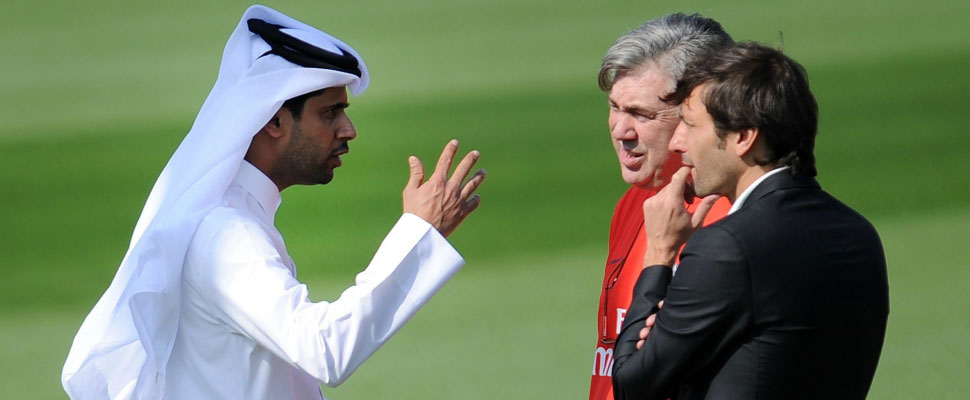Why do the Arab Sheikhs buy football teams?
There are several Arab billionaires who have dabbled in this sport, but few know who they are, where they come from, and why they do it

Countless figures of money move in the world thanks to football, and it is precisely this situation that motivates Arab billionaires, better known as 'sheikhs', to invest in clubs from different parts of the planet. This dynamic has been almost 10 years, considering itself relatively new, which is why several questions arise:
Leer en español: ¿Por qué los Jeques árabes compran equipos de fútbol?
Mansour bin Zayed Al-Nahyan, Nasser Al-Khelaifi, Abdullah Ben Nasser Al-Thani, and Salman Bin Ibrahim Al-Khalifa Are they the most recognized 'sheikhs'? What is the real goal of acquiring football clubs? Has their great economic power dabbled in Latin America?
They are famous for their clubs and Latin America stands in line
Several are the sheikhs who have acquired football clubs in the 21st century. One of the most recognized is Mansour bin Zayed Al-Nahyan, an Emirati politician and businessman who is a member of the ruling family of Abu Dhabi and the Supreme Council of Petroleum. His excellent financial conditions have allowed him to acquire since 2008, with his economic group City Football Group, clubs in different parts of the world: Manchester City in England, Girona FC in Spain, New York City in the United States, Melbourne City in Australia, Yokohama F. Marinos in Japan and Club Atlético Torque in Uruguay.
His collection of equipment and his economic empire continues to search for clubs around the world, especially in Latin America. A few years ago, they tried to buy the Brasília Futebol Clube from Brazil and recently came to light a possible negotiation with Deportivo Independiente Medellin of Colombia, according to the well-known radio station Antena 2. Latin America has been the last region to be explored by the sheikhs, but sooner or later this potential market will be exploited.
Also read: When being a soccer player is a high-risk profession
Former Qatar tennis player Nasser Al-Khelaifi, who has not only focused on football but has also dabbled in tennis, his original sport. The Qatari is the owner of Paris Saint-Germain in France since 2011, is the president of the Qatar Tennis Federation, the Asian Tennis Federation and the Bein Sports television network.
The indisputable dominance of PSG in French football is one of the great achievements of Nasser Al-Khelaifi, but the economic gains that this entails can be a superior triumph. The club has positioned itself worldwide with the purchase of great players, mostly Latin Americans. The role of Latin America in the business of the two most important sheikhs of football has been secondary, but it promises to take center stage.
Sheikhs: builders of great economic empires
One of the biggest questions is why sheikhs invest in football. There are several hypotheses, which speak of lack of prominence and recognition that can be achieved with eccentricities such as acquiring football teams. However, the main reason for these dynamics is the need to expand their extensive economic empire.
The sheikhs usually acquire clubs with large economic debts to make up this deficit, to gain followers with these disbursements, and to enter the cities where these clubs belong, gaining business partners, many of these non-soccer. Proof of this is Mansour bin Zayed Al-Nahyan and his City Football Group, as their profits are focused on the collection of television rights, on the commerce generated by all their clubs around the world and in building business, mostly of infrastructure, in the cities where their teams play.
It may interest you: Learn the reasons why James could not triumph in the successful Zinedine Zidane cycle
When the business does not prosper
Not all sheikhs who have invested money in football have achieved positive results, and Abdullah ben Nasser Al-Thani attests to that. This Qatari sheikh acquired Málaga CF from Spain in June 2010, and although it is true that the team had an outstanding performance in the 2012-2013 UEFA Champions League when they reached the quarterfinals, the following season the club was suspended by UEFA due to its large debts. The club had good seasons and other regular seasons, and in April 2018 it fell to the second division of Spain. Currently, other club members plan to sue him for mismanagement.
Another great sheikh who did not see his great investment reflected in favorable results was Salman Bin Ibrahim Al-Khalifa, current president of the Asian Football Confederation. The bareíní invested millionaire sums of money to finance its campaign in search of the presidency of the FIFA. Although the Sheik got support from Asia and Africa, he lost the fight with the Swiss Gianni Infantino in February 2016. The Sheikh lost large amounts of money, but it can be said that this loss, compared to his total fortune, was just a bad business without great consequences.
The culture of the sheikhs in football is growing. The Arab economy allows the immersion of its billionaire characters in football clubs around the world, which are highly seduced by the promised economic injection and from which they could have unforeseen benefits. Contemporary football moves with money and this only means a great business opportunity for the sheikhs.
Latin American Post | Javier Aldana
Translated from “¿Por qué los Jeques árabes compran equipos de fútbol?”





